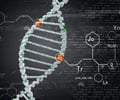Researchers have described their effort to identify the minimum Y chromosome contribution required to generate a healthy first generation mouse, capable of reproducing a second generation

"Does this mean that the Y chromosome (or most of it) is no longer needed? Yes, given our current technological advances in assisted reproductive technologies," said Monika A. Ward, Associate Professor at the Institute for Biogenesis Research, John A. Burns School of Medicine, University of Hawai.
At the same time, however, she also emphasized the importance of the Y chromosome for normal, unassisted fertilization and other aspects of male reproduction.
Ward and her colleagues used transgenic male mice with only two Y genes, Sry and Eif2s3y. The mice were considered infertile because they had meiotic and postmeiotic arrests- that is, the germ cells that should have normally developed into sperm did not fully mature in these mice- but researchers were able to find few usable cells.
Yasuhiro Yamauchi, a post-doctoral scholar on Ward's team, harvested these immature spermatids and used a technique called round spermatid injection (ROSI) to successfully fertilize oocytes in the laboratory. When the developed embryos were transferred to female mouse surrogate mothers, live offspring were obtained.
Because the overall efficiency of ROSI with two Y genes was lower than with regular, fertile mice, the researchers then looked to see whether the addition of other Y genes could improve it. They increased the live offspring rate by about two-fold when Sry was replaced with the sex reversal factor Sxrb, which encodes three additional Y genes.
The study's findings are relevant but not directly translatable to human male infertility cases. In the era of assisted reproduction technologies, it is now possible to bypass several steps of normal human fertilization using immotile, non-viable, or immature sperm.
The study is published in the journal Science.
Source-ANI
 MEDINDIA
MEDINDIA



 Email
Email








